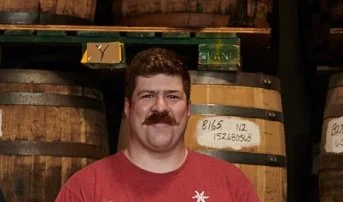Desert island whisky:
Booker’s Bourbon—I’m a sucker for the big oak, vanilla sweetness of it.
Guilty pleasure drink:
I might have too many of them to call it a guilty pleasure, but our American Northwest IPA, Conspiracy IPA, is almost always in my fridge.
Favourite whisky from your own lineup:
Release 33 that we did last year.
Can you tell me a bit about yourself and the company?
We opened in 1997. My dad [Bob Baxter] and Alan Hansen, his business partner for 26 years now, are the two brewers that are referred to in our name. I wear a few hats, but I think the pertinent one here is I’m leading the distilling operation. I got a degree from the University of Toronto in chemical engineering, so I had a bit of school learning around distilling processes and understanding the general principles involved.
I've heard that Two Brewers aged whisky for seven years before releasing its first bottle. What was the reasoning behind waiting well past the three-year mark?
The whisky wasn't ready in Alan's and Bob's eyes. The other side of it is that we were successful as a brewery. There's pressure on new distilleries that are aging their spirits to generate some revenue, and we didn't have that same level of pressure. That allowed us to let things continue to age beyond where they were legally considered whisky. We might have been forced to bottle something earlier if we didn't have the luxury of the money that beer was bringing in.
What’s the reasoning behind avoiding age statements for your whisky releases?
There’s a little bit of a philosophical [reason], fighting against the idea that older is better—especially in Canada where a lot of a lot of Canadian whiskies that are 25 years old still feel like they could have some more maturing to do, just because of the barrel choices.
The more practical answer is that we blend a large amount of our whiskies, and often we will blend in 15 per cent of something that's five years old to a blend that's largely eight or nine years old, just because we like the character that it brings. If we were going to put age statements on every [bottle], we would have to use the youngest whisky to characterize everything and that would be a mischaracterization of the whisky. If you give people something to latch on to like that, they'll make all kinds of assumptions about it as opposed to just trying the whisky.
As we get a bigger warehouse full of older whiskies, we tend to put down about twice as much whisky as we sell. So, the average age of the warehouse is getting older and older. Now we're consistently putting out seven- to 10-year whisky.
What’s your general approach to blending whisky?
It's probably born out of that engineering background: [we’re] pretty formulaic about it. We will sometimes go looking for a particular character, but a lot of the time, we have spreadsheets with tasting notes in them. And that kind of developed a method of characterizing the samples that we go through to try and pick matches. And then once you kind of latch on to a characteristic you like, or a style or presentation of a whisky, we kind of go about looking for ways to make it come together. We will pull a large library of samples and mix until we find something that we are happy with.
How do you feel that your geographical location factors into your products? Is there a style or terroir that you think shows up in your whisky?
I think there is, but it's probably not what people expect. We get cold enough that we can actually have barrels of whisky freeze, so we have to store all of our barrels inside. This means that our barrels sit at room temperature for years and years, and I think it speeds up the maturation process quite a bit. We also are very dry; we're a cold desert up here. So, it just sucks all the water out of the barrels and brings the whisky into [the wood] and speeds it up even a little bit more.
For the 2023 Canadian Whisky Awards, you entered seven whiskies and won seven gold medals, not to mention Artisan Producer of the Year. What do you think it is about your whisky that's winning awards?
I don't know if there's anything beyond that it tastes really good. We try to take some of the ethos from craft brewing and the knowledge that we have of different malts and grains, fermentation techniques. A lot of time and care goes into each of our releases. We're constantly tasting things, and constantly looking for ways to kind of guide the maturation process as the whiskies get older and older.

